An In-Depth Buyer’s Guide to Help You Choose the Best Banjo
Are you looking for the absolute best banjo to buy? Banjos are fantastic instruments that are often used to play Bluegrass, Folk, Blues, Country, Indie, Celtic, Alternative, and Rock music. They’re great for busting out unique solos, adding unparalleled rhythmic notes, and creating complex and melodic accompaniment patterns. Not to mention that banjos are incredibly fun to play, and banjo players are downright enigmatic.
An Array of Amazing Banjos to Consider
Whether you’re just learning how to play the banjo or are already an accomplished musician, you’ll learn all you need to know to buy a banjo. There are certainly plenty of amazing options to check out! However, with so many choices to consider, narrowing down your options can feel overwhelming. You definitely don’t want to splurge on the wrong banjo.
So what makes a banjo great, anyway? Well, that’s what we’re here to look into. We want to help you find a banjo that you’ll really love! This guide is all about banjos, how to buy the best one for your needs, and what features make a particular banjo stand out as a top option.
But let’s have a quick look at our best banjo list:
1. Deering Sierra 5-String Banjo
The Overall favourable Banjo to Buy
This is possibly the best 5 string banjo available for mainstream buyers right now. It makes a good choice because it showcases a premium design and features an array of impressive specifications. The Deering Sierra 5-String Banjo is made in America and has a unique ‘06 bell bronze ring and resounding tone.
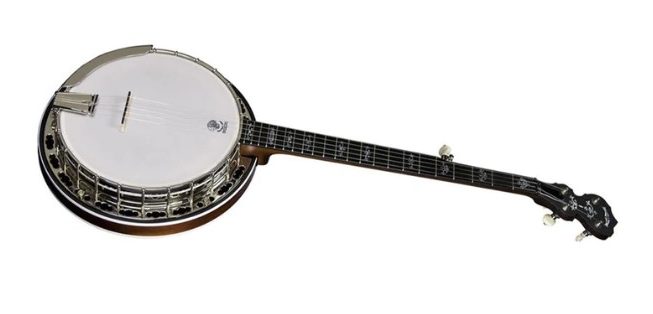
Image credit: Deering
Banjo Studio
It has a three-ply Maple rim, Deering planetary tuners, fully-adjustable tailpiece, one-piece resonator flange, satin finish, and a stunning real mahogany neck. Plus, its stunning and smooth pure ebony fingerboard makes it a true pleasure to play. It’s a beautiful instrument of nearly unparalleled quality for the price.
2. Deering Goodtime 5-String Banjo
The Best 5-string Banjo With a Lightweight Design
The Deering Goodtime 5-String Banjo is easily the best 5 string banjo with a lightweight open-back design. It’s great for clawhammer playing and other fingerpicking styles as well. This banjo has great consumer ratings and is good-looking at every angle. It also has a low-profile 22-fret neck made of Rock Maple with hardwood bowtie style inlays.
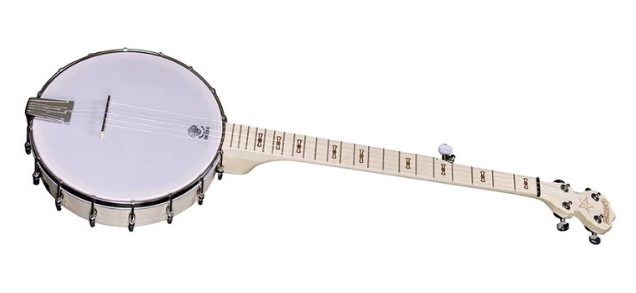
Image credit: Deering
Amazon
Then, it features sealed geared tuners on all 5 strings. Its Maple and Ebony bridge measures ⅝-inches and its tailpiece is completely adjustable. Finally, it has a three-ply Maple rim and steel tension hoop with a crown head.
3. Deering Goodtime 2 5-String Banjo
Likely The Best Clawhammer Banjo Under $500
The Deering Goodtime 2 5-String Banjo is a great banjo for clawhammer style playing. This is also probably the best banjo under $500 to buy. Overall, it has a quality design that’s been durably constructed with attractive details and a ton of user-friendly features. Its smooth neck is perfect for complex chord changes and solos.
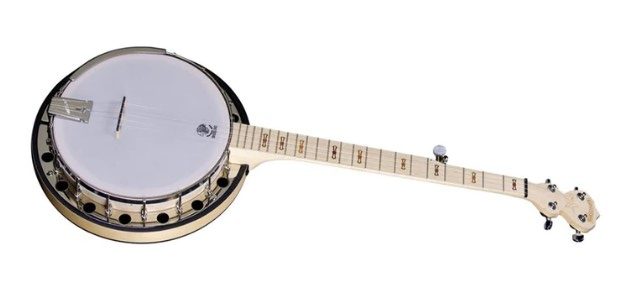
Image credit: Deering
Amazon
Players will also appreciate its slender rock Maple neck, sealed geared tuners, three-ply Maple rim, adjustable tailpiece, and single bound Maple resonator. You’ll get all of this for a great price! On top of that, this banjo has outstanding ratings from musicians all over the United States.
4. Washburn Americana Series B6-A 6-string Open Back Banjo
One of The Best 6-String Banjo Options to Consider
Are you looking to play a 6-string banjo? If so, this Americana Series Banjo from Washburn is a great choice to look into. It has a lightweight open-back design and a durable build that will ensure that it lasts you for years to come.
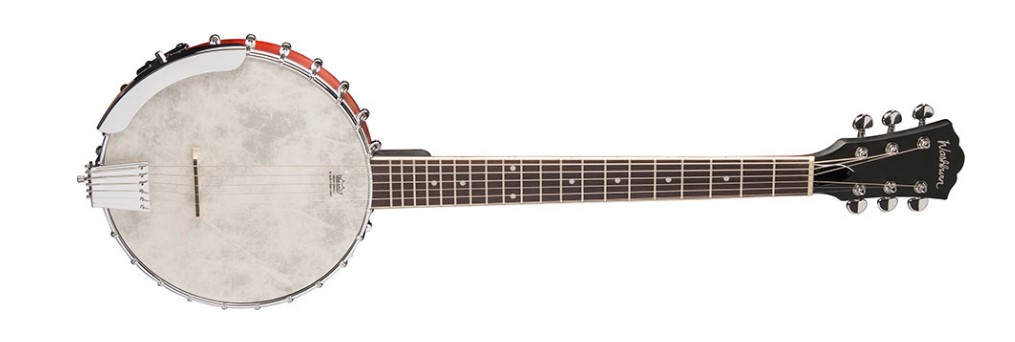
Image credit: Washburn
Amazon
It has a full 6-string setup and features an open back 6 string natural finish, Chrome die-cast tuners, an Ebony and Maple bridge, pristine articulation, an engraved gold armrest, and a distressed authentic Remo head for a vintage look and warm full tones. Plus, this banjo comes with a set of premium D’addario J60+light Gauge nickel strings and won’t break the bank.
5. Oscar Schmidt LEFT HAND 5-String Banjo
Possibly The Best Overall Left-Handed Banjo
Left-handed players can find it hard to shop for banjos. Not to worry, this premium Oscar-Schmidt 5-String Left-Handed Banjo has you covered! It boasts a real Mahogany resonator, a gorgeous Remo head, and lets you create beautiful and rich tones, even if you play left-handed.
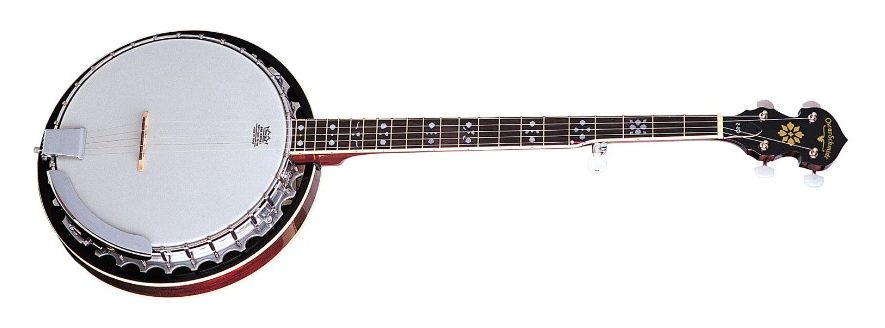
Image credit: Oscar Schmidt
Amazon
It was made exclusively for left-handed players and also features a 30 bracket cast aluminum tone and geared 5th string tuner. Its glossy finish and Rosewood inlay make it a true beauty among left-handed banjos!
6. Deering Goodtime Special 5-String Banjo
One of The Best Bluegrass Banjo Options
A special edition masterpiece, the Deering Goodtime Special 5-String Banjo is ideal for pumping out rich and clear resonating Bluegrass tones. You’ll immediately notice the engraving on the head that proves that this banjo is a specialized and unique instrument.
It has a patented design and ring with a powerful and crisp tone that is considerably better than even some of the most expensive banjos. While this banjo doesn’t come cheap, its features truly match the high price tag. It has some of the most impressive acoustic volume available.
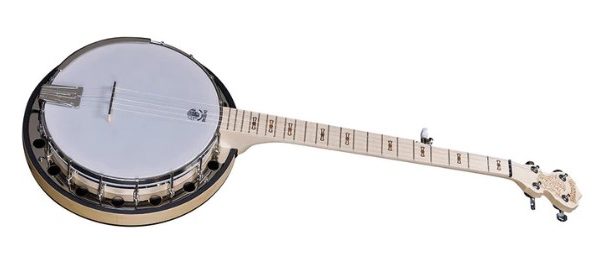
Image credit: Deering
Amazon
Additionally, this banjo has a blonde Slender Rock Maple neck, 22 frets, bowtie inlays, 5 sealed geared tuners, a fiddle-shaped peghead, and a satin finish. Its crisp bell tone is stunning and it’s also easy to play with clear note separation.
7. Vangoa 5 String Banjo with Beginner Kit
The Best Beginner Banjo
If you want the best starter banjo, this Vangoa Banjo Kit is well worth considering. It has a closed-back design that gives it rich and clear tones and comes with everything you need to get started right away. The kit includes a tuner, picks, strap, and even comes with a carrying case. Plus, you’ll get everything for a great overall price and it is a great choice for beginners.
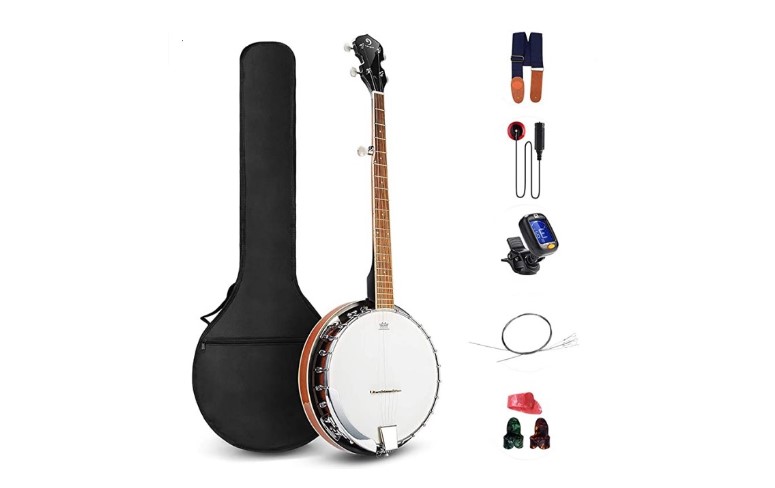
Image credit: Vangoa
Amazon
Buyer’s Guide at a Glance
In this guide, we show you not just one but seven amazing banjos that pretty much any musician can appreciate. Plus, we’ll go over the different playing styles, skill levels, price ranges, and more. That way, you’ll be able to buy a banjo that matches your tastes, needs, and style as a musician.
The first thing this guide will cover is what makes a banjo great. After that, we’ll discuss some amazing banjo makers and instrument styles.
Lastly, we’ve included a helpful FAQ section to cover anything else that you might need to know as you shop for the perfect banjo. Without further ado, let’s dive in!
Features to Look For
- Expert Craftsmanship
- Quality Material Construction
- Trusted Industry Brand Name Designs
- User-Friendly Bonuses
- Attractive Overall Aesthetic
- Ergonomic Utility
- Ability to Meet Your Specific Playing Style
Which banjo features are best to look for?
First and foremost, let’s talk about the aspects that make banjos superior. There’s a lot of debate surrounding which features are most important in a good banjo. Some musicians will adamantly insist that resonation is the biggest factor to consider. On the other hand, many players value versatility, durability, lightweight construction, and ergonomic utility.
Then, some people feel like the right banjos are made with premium high-end materials and showcase intricate designs and aesthetically appealing decorative features. Finally, there are always the die-hard brand loyalists who insist that banjos from certain makers are unquestionably better.
In our opinion, the ideal banjos will implement all of these features to some extent. Keep in mind that what one musician prefers may not be ideal for other players. Some banjos are made to be plugged into a sound system and played on stage while others have rich acoustic resonation that’s perfect for late-night jam sessions and get-togethers with friends. No matter what, you’ll want to find a banjo that strikes a good balance of utility, quality, style, and sound.
Therefore, we highly recommend looking for banjos that have been designed to fit your specific playing needs. Opt for instruments that have been crafted by trusted industry specialists, constructed of durable, high quality materials, and enhanced with ergonomic, user-friendly features. Most importantly, remember that it has to create a sound that’s literally music to your ears. After all, that’s what’s most important!
Factors to Consider a You Shop for Banjos
As you’re browsing through the various banjos for sale, there are a few things that you’ll probably want to keep in mind. Asking yourself a few key questions can make buying the perfect banjo much easier.
Genre
What style of music will you be playing? Banjos can have designs that work well for different genres. Some banjos are optimized for Bluegrass and Folk music, while others are better as accompaniment instruments.
Budget
What is your budget? Banjos may cost anywhere from $100-$5,000. Just because one particular banjo costs more doesn’t necessarily mean it’s a better option for you. With that being said, within reason, you really do get what you pay for when buying musical instruments.
We say within reason because, after a certain point, prices increase based more on design features than actual utility and sound. You’ll want to figure out where your budget and preferences logically meet up and get in sync.
Style and Sound
What kind of banjo do you need? Banjos can have 4, 5, 6, or 12-string designs. Tenor, parlor, low, and plectrum banjos are also available. Banjos may come in various sizes and feature different fretboard lengths as well.
While most banjos have between 19 and 22 frets, some large resonator banjos can have as many as 25 frets! The larger a banjo is, the deeper its sound and resonation will be. There are also open-back and closed-back banjos to choose from.
Use
How are you going to use your banjo? If you’re going to be playing on stage, you probably need an acoustic-electric banjo. At the very least, consider getting a banjo that can accommodate an acoustic pickup system.
If you’re playing for fun, you may want a lightweight instrument with a durable design. For studio recording or jam sessions, a resonating banjo with rich sound will be best.
What are the number 1 banjos in the world?
This is another question that’s subject to a lot of debate. There are a few classic RB banjos from the 1960s-1970s that are known for being insanely impressive. Certain modern Deering, Gibson, and Washburn banjos can also be pretty impressive. With that being said, banjos like this aren’t for everyone and can get pretty pricey.
For instance, the 1979 Gibson RB-800 Mastertone features a golden brown tobacco sunburst, flamed Maple neck and resonator, engraved nickel plated and gold tailpiece, flathead jade tuners, ebony ‘hearts & flowers’ inlay, and ‘checkerboard’ binding. However, this collectible banjo is pretty hard to come by and costs a pretty penny if you do find one.
There’s also the Deering Phoenix 6-String Acoustic-Electric Banjo. It has an unforgettable organic tone and comes with a Kavanjo pickup system. It’s a gorgeous and unique banjo that’s top-notch from every angle. This high-end banjo also showcases a satin finish, Maple wood neck, and pearl inlays.
Once again, this banjo doesn’t come cheap, so you’ll want to keep that in mind.
So what is the best banjo to buy?
While there are some truly stunning and extravagant banjos out there, it may be smarter to look for something that comes at a more realistic price. Since most people aren’t able to drop $3,000 on a banjo, we’ve chosen some of the best affordable premium quality banjos as top options for you to consider.
As such, one of the top buys that’s both well-made affordable might just be the Deering Goodtimes 2 5-String Banjo. This gorgeous banjo has a rich sound, is made of quality materials, and priced realistically. Runners up for best banjo to purchase include certain other premium Deering banjos, the Washburn B10 5-String Banjo, the Ibanez B50 5-String Banjo, and the Vangoa 5-String Banjo.
Banjo Buying FAQ Section
Since now you know all about banjos and have seen some truly impressive options, let’s go over some frequently asked questions about these instruments. That way, when it comes time to make a purchase, you can proceed with confidence.
• Which is better, an open-back or closed-back (resonator) banjo?
Both open-back and closed-back (resonator) banjos have a lot of similarities. They’re played in the same way, but create slightly different sounds and tones.
Open-back banjos are often played clawhammer style without a pick and their strings are a bit further out from the fretboard. These banjos are often lightweight and great for travel. Open-back banjos are ideal for playing certain types of Folk music.
Closed-back resonator banjos have a piece of wood that provides lots of acoustic resonation. These banjos can easily be played with or without a pick. They’re a bit heavier than open-back banjos but do create an impressive and rich sound. Resonator banjos are great for Bluegrass music, Country, Jazz, and more.
Both banjos styles are great options for players at any level. It will all come down to your own personal style and utility needs. If you’re unsure which type of banjo to choose, we would recommend opting for a closed-back resonator banjo. That way, you’ll have more flexibility in the style and sound.
• Who is the best banjo player of all time?
There have been many infamous banjo players over the last 100 years! Without a doubt, top players include Bela Fleck, Charlie Pools, Peet Seeger, and of course, Earl Scruggs. Steve Martin also plays the banjo! Finally, you’ll hear some amazing banjo riffs from bands like Trampled By Turtles and Mumford and Sons.
• How much should I pay for a Banjo?
Banjo prices can vary based on quality, brand, material construction, seller, and size. Other factors like tone and style may also influence the price of a banjo. So how much should you pay? Well, that’ll depend heavily on your budget and needs.
Used low-quality banjos may be purchased for as little as $40. Premium designer banjos with custom features or collectible designs may cost you thousands of dollars.
To determine how much you should pay, think about what applications you will be using your banjo for. If you’re looking for a cheap backup banjo or want to learn how to play but aren’t sure if you’ll stick with it, opt for something between $100-200.
If you are an accomplished banjo player and want something nice, you may want to spend between $400-$1,000 to get something really nice. Finally, if you’re a relatively new player who wants a better banjo because you plan to start playing regularly, a durable and well-made banjo in the $250-$500 range should do nicely.
The Best Banjos by Playing Style and Type
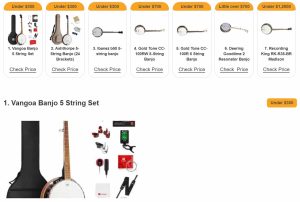
Banjos for Bluegrass
Dive into the world of Bluegrass with our top picks that deliver on tone, volume, and responsiveness.
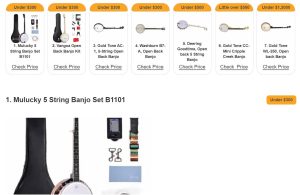
Clawhammer Banjos
Uncover the soulful charm of Clawhammer playing with banjos that capture the essence of this traditional style.
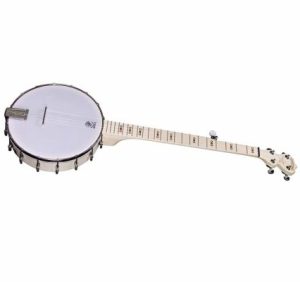
Open-Back Banjos
Discover the top choices for a mellower, open sound.
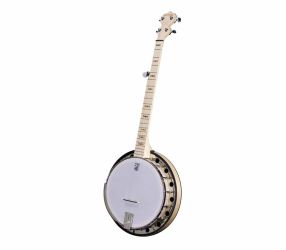
Resonator Banjos
Explore banjos designed for projection and a distinctive resonance.
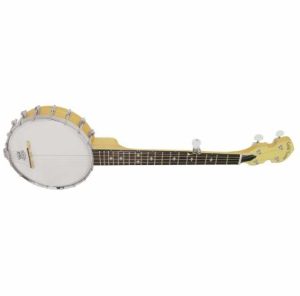
Travel Banjos
On-the-go musicians, explore our selection of compact and travel-friendly banjos without compromising on quality.
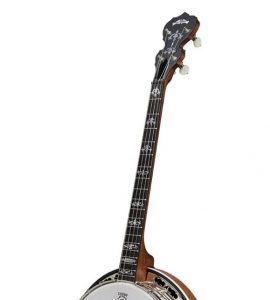
4-String Banjos
For those seeking a unique sound, our top 4-string banjos cater to varied musical preferences.
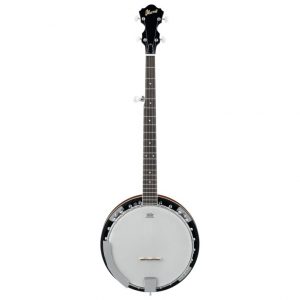
5-String Banjos
The quintessential banjo experience awaits you in our selection of top-tier 5-string banjos.
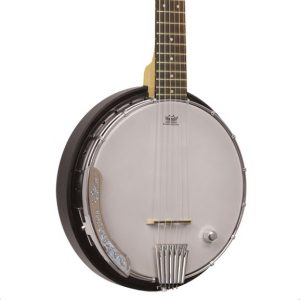
6-String Banjos
Elevate your playing with the rich, melodic tones of our recommended 6-string banjos.
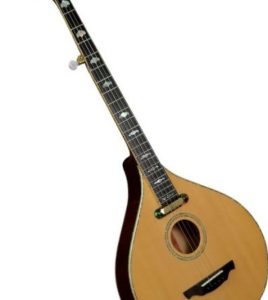
Banjo Ukes, Banjolele
Combine the charm of a ukulele with the twang of a banjo in our collection of Banjo Ukes and Banjoleles.
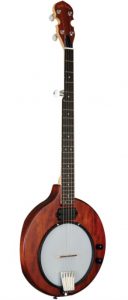
Electric Banjos
Step into the future of banjo playing with our top picks for electric banjos that redefine versatility.
